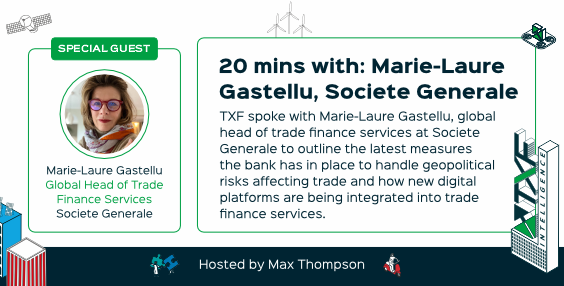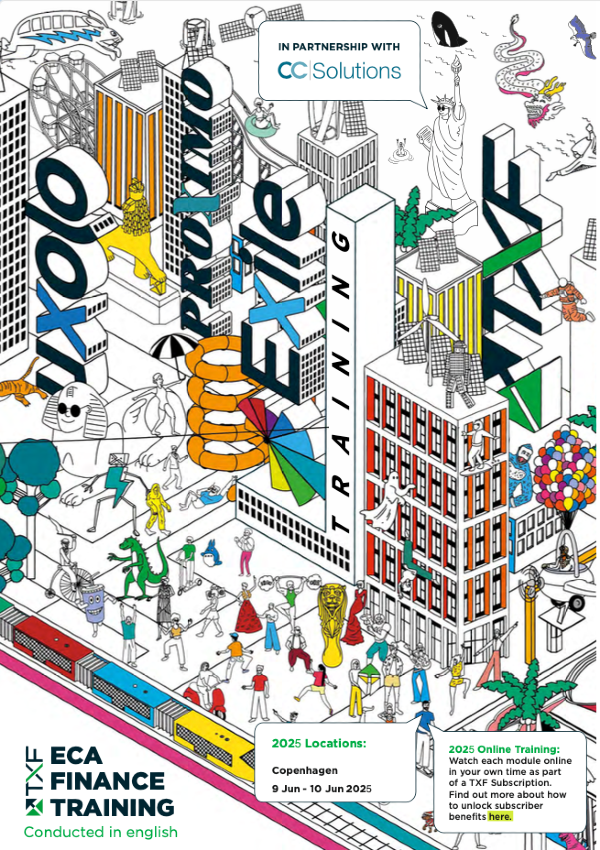Mind the gaps: On trillions, trade and financing women-owned and run businesses
TXF talks to Makiko Toyoda and Jessica Schnabel, the women who are spearheading the development of IFC’s latest initiative to raise access to trade finance for women-owned businesses, revealing ambitious goals and the practical steps to help fulfil them.

What’s in a number? The Asian Development Bank has gained a lot of media traction over the past few years on $1.5 trillion being the value of the trade finance gap globally. You can’t easily copyright a number, and $1.5 trillion is also quoted by the IFC as the estimated amount of credit demanded for women-owned SMEs in emerging markets that’s not met by financial institutions (other, higher, numbers are also quoted).
“It's totally coincidental,” Jessica Schnabel, global head, Banking On Women, Financial Institutions Group (FIG) at IFC tells TXF. "The $1.5 trillion I just described represents IFC and World Bank, IMF and national statistics bureaus' best estimate of the unmet demand for credit for registered women-owned SMEs in emerging markets, the difference between supply and demand of finance that's not met by banks. And that doesn't even include credit demand from the informal sector."
Conceptualising large numbers is always a problem. One and a half trillion seconds is more than 47,500 years, if that helps. And even if the numbers are estimates, the gap is a lot. Where the trillions coincide/collide, and most likely overlap, is in funding trade for women-owned companies. The IFC estimates there are ‘roughly’ 6.6 million formal SMEs owned and run by women and 39 million micro-businesses in emerging markets.
Why is this important? According to the International Trade Centre (ITC) women-owned SMEs that export tend to earn more, pay more and employ more people and be more productive than firms that only operate domestically. Nonetheless, only one in five exporting companies is owned and run by a women and “those women-owned businesses are more likely to face obstacles to trade.” Trouble is, when all the numbers are that big, it seems very difficult to do something meaningful about it. Abstraction is a big challenge.
Tangible steps to accessing trade finance for women-owned/run businesses
In early July, the IFC and Goldman Sachs Foundation launched the first gender-focused trade finance programme to promote access to trade finance for women exporters and importers. The Banking on Women-Global Trade Finance Program (BOW-GTFP) gives incentive to the 285 emerging market partner banks in low income and fragile countries that are in the IFC’s Global Trade Finance Program to increase trade finance for women importers and exporters and encourages those financial institutions to track their business with female entrepreneurs. As most banks do not monitor whether or not they lend to women-owned/run ventures, the three-year initiative aims both to identify and encourage trade finance lending and improve the access of women to trade financing.
A better measure
How does the project make things more concrete in the face of all those daunting and abstract trillions? First is getting a real measure of the problem. “We’re really excited about this initiative,” says Schnabel. “It’s at the intersection of financing women and trade finance. It aims to do two important things, one is to understand the dynamics of trade finance flows to women owned enterprises in emerging markets. Very little is known about the volume of trade finance to women entrepreneurs. The very first thing to do is to understand what those trade flows are about and contribute to the evidence base so that international financial organisations such as the IFC and global partners and commercial banks can begin to understand where the gaps actually are.”
Second is the incentivisation of the banks in the IFC’s Global Trade Finance Program (GTFP), which is the largest of IFC’s seven trade finance programmes, to increase trade finance to more women through the programme itself.
Specifically, the trade instruments include standard vanilla documentary trade instruments such as letters of credit (LCs), trade related promissory notes, bills of exchange, bid bonds, guarantees, etc. The GTFP itself is a guarantee programme with no funded operations and it takes the risk of the financial institutions.
Makiko Toyoda, acting head of GTFP, IFC gives TXF some context to the numbers involved. The trade finance department booked $170 billion since the inception of its trade finance programme in 2004. The largest, flagship, programme is the GTFP, comprising over 40% of the total IFC trade programmes. It booked more than $65 billion with an average size of transactions of around $1 million, which are booked directly one by one onto the platform. Toyoda says the trade exposure in the [currently 85] countries on the platform has been growing an average of around 20% a year for the past seven years, one of the fastest growing IFC businesses [although volumes have fluctuated]. “Between last year and this we booked around $11 billion under GTFP,” she says.
“This incentive programme is a great addition to our trade finance platform,” Toyoda says. Schnabel’s FIG group at the IFC has been working on women’s access to SME finance, microfinance and other sectors, “and maybe trade has come last,” Toyoda adds. “So I’m really happy that we were able to attract the gender group’s interest towards trade finance and we’ve worked together for around a year to make this happen.”
Asking the right questions
“While we’ve executed 65,000 transactions, our 40-or so staff in trade finance group has never asked whether the importing company is owned by men or women,” Toyoda says. “For the IFC as part of the World Bank Group, our main goal is to raise awareness and support women-owned SMEs. We are asking the partner banks to see if they can identify women-owned businesses, and, frankly, if they’ve had any hesitation working with [such] businesses we are providing advisory services and a little bit of price incentive to help them make the decision to make the transactions happen.”
In terms of Know Your Customer (KYC), IFC also published a new book with the WTO on trade finance, the compliance challenge at the same time as announcing the initiative.
Targeting 10% of deals
So far, so good, but what actually constitutes success for programmes such as this? “We don’t have numerical targets as such,” says Toyoda, “but we hope to receive deal inquiries from banks who are incentivised to look for women-owned businesses and aim to book 10% of transactions as a rough target for women-owned enterprises. That may be too ambitious as we’ve just started but the first transaction has already been booked at launch, so we’re off to a good start.”
Isn’t this initiative something that should happen women-owned business in the developed markets as well as emerging markets? “That’s correct,” Toyoda says. “Globally, within our correspondent bank and confirming bank network as well, awareness should be raised too. We have some general studies that women-owned businesses are less likely to be able to export. If women’s participation in trade finance is less than men’s then this is a legitimate mandate to help those business those access trade.”
Heroes or heroine banks?
Could the IFC spotlight the banks that are doing well, as heroes, or, more appropriately, heroines? The IFC already runs annual awards on best banks in regions. Toyoda plans to showcase “Best bank in Gender Businesses,” Watch this space as to whether the heroine banks emerge by the end of this year.
Whether it’s $1.5 or $1.7 trillion, does the IFC need a banner number to hang this project off? Probably not. But real numbers, providing real data and helping real people with a financial need will hopefully pay dividends.
Now time to get up to speed on the markets.
Here's our exclusive TXF Essentials subscriber content
Talking tomorrow’s trade finance with SWIFT: Blurring the lines
TXF sat down with industry experts to look at how changes in corporate trade and supply chain and digitisation are blurring the lines between cash management and financing international trade sustainably.
TXF Global Berlin 2019: Berne Union on ECAs and SDGs
From the sidelines of TXF Global, Vinco David, secretary general of the Berne Union, talks about the opportunities for export finance in sub-Saharan Africa, the recent increase in ECA-backed renewable energy projects, and why banks and ECAs need to align their SDG goals.
Sullivan: A bright future for trade finance?
In the latest edition of law firm Sullivan’s Trade Finance Breakfast Seminar, partner Geoffrey Wynne questions whether there is a bright future for trade finance?
DRC: Learning from the pitfalls of small-scale mining
Small-scale miners in the Democratic Republic of Congo (DRC) produce one third of the country’s cobalt amid dubious environmental and ethical standards. But can international and local mining groups help address the issue and provide regulatory frameworks to move the market to bankable structured financing?
Hydrocarbons sector remains a lynchpin of bank financing
Despite some of the legal challenges taking place in the US, financiers can be expected to remain committed to the huge volume of hydrocarbons financing which will take place over the next couple of decades. Jonathan Bell examines the scene.
Finerge puts borrowings in one basket
First State Investments-owned Finerge’s recent Portuguese wind portfolio refinancing knocked around 100bp off the cost of debt and upped the tenor. But most significantly it is structured as a platform for future Finerge borrowing, with potential extra liquidity built in.
Risky business: Tech-tonic shifts in trade wars
In the first of this series of Risky Business podcasts Coriolis Technologies CEO Rebecca Harding talks to TXF’s Katharine Morton about where we are now with trade weaponization and the effect that trade wars are having on the key power relationships and physical supply chains globally, with technology at the forefront.
Plus, to top things off..
the news you thought you had but didn't.
Twenty-five pre-qualify for Al Dhafra
Twenty-five bidders have pre-qualified for EWEC’s 2GW Al Dhafra solar PV project in Abu Dhabi.
Dumat al Jandal wind farm deal to close today
Sponsors of the 400MW Dumat al Jandal wind farm in Saudi Arabia – EDF Renouvelables (51%) and Masdar (49%) – signed a $270 million 20-year soft mini-perm financing to fund the scheme on 30 June 2019. Full financial close is expected today (8 July).
More details on Beacon Rail refinancing
Details are emerging on UK rolling stock lessor Beacon Rail’s €1.45 billion ($1.63 billion) refinancing in late June.
Ka-Kit Man joins DBS Bank from CCRManager
Ka-Kit Man has joined DBS Bank as senior vice president, trade asset management at DBS Bank in Singapore.
UniCredit promotes Dewan
UniCredit has promoted Amit Dewan to head of infrastructure and real estate international fund coverage.
Huggins joins AIFFP
Tim Huggins has transferred to the Australian federal government’s newly-launched A$2 billion Australian Infrastructure Financing Facility for the Pacific (AIFFP) as a director.
Ancala's Dragon LNG acquisition debt signed
Anacala Partners has closed on the £101 million ($125.7 million) debt backing its 50% acquisition of the Dragon LNG regas/terminal in the UK from Petronas.
Kruse new UniCredit head of project finance
Following Massimo Pecorari’s promotion in April to UniCredit head of financing and advisory for Italy, Volker Kruse has taken over as global head of infrastructure and power project finance.
Alerion closes on Comiolica PV acquisition financing
Alerion Clean Power has closed on the acquisition debt for its €41 million ($46.6 million) purchase of Comiolica in Spain – owner of a 36MW wind project in Teruel – from Boalar Investments.
Hobbs joining Metrolinx
After five-plus years as vice president of Strategy and Stakeholder Engagement at The Canadian Council for Public-Private Partnerships (CCPPP), Steve Hobbs is joining Metrolinx as director of Policy & Strategy. Hobbs will be replaced at CCPPP by Andrew Koolsbergen from 22 July.
Vive Energia nears bank mandates for Mexican wind project
Mexican power developer Vive Energia is progressing with final negotiations for a $70 million project loan to finance its 63MW Guanajuato wind scheme in central Mexico. Bank mandates are expected in Q3 2019, with financial close targeted for year-end.
Edible oil trader MW Beer cooks up £1.3m loan
MW Beer, a UK based trader and shipper of vegetable oil and fats, has closed a £1.3 million ($1.6 million) revolving credit (repayable every 120 days).
Colombia's Antioquia port nears close
Puerto Bahia Colombia de Uraba – a consortium comprising French company CMA terminal holdings and Colombian port owner PIO – is expected to reach financial close imminently on a $300 million DFI-backed loan to finance the Antioquia port in Colombia.
Tenergie portfolio refinancing nearing close
Tenergie is said to be nearing close on an €800 million ($901 million) refinancing of a major chunk of its renewables portfolio.
Prostar makes two new senior appointments
Prostar Capital – a private investment firm focused on midstream energy infrastructure assets – has appointed Garrett Sussman and Brooke Callaghan as head of Portfolio Management and head of Investor Relations, respectively.
Formosa 2 financing progressing
The Formosa 2 offshore wind financing is progressing. The sponsors – Macquarie Capital (75%) and Swancor (25%) – and financial adviser Societe Generale, are evaluating 10-plus priced bank proposals and expect to sign on the debt before year-end.
RFPs delayed for 300MW Scaling Solar tender in Ethiopia
Request for Proposals (RFPs) for the 300MW Scaling Solar tender in Ethiopia have been pushed back by the country's Ministry of Finance to 15 August 2019.
Kirikkale debt restructuring progressing
Sponsors of the $1 billion 950MW Kirikkale independent power project in Turkey – ACWA Power and Samsung – are said to be close to finalising a debt standstill agreement with lenders to the original project financing.
ContourGlobal refinances Italian PV portfolio
ContourGlobal and Credit Suisse Energy Infrastructure Partners have refinanced a 77MW portfolio of jointly-owned Italian solar PV plants.
Al Karsaah solar bids in
Qatar General Electricity and Water Corporation (Kahramaa) has received five bids for the 700MW Al Kharsaah solar 25-year BOOT concession.





